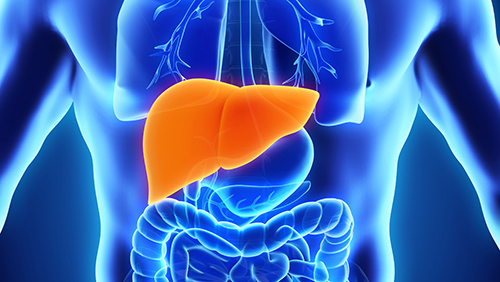Liver Transplant

We are a leader in liver transplantation. Interested in an evaluation? Learn more about:
Liver Transplant
The liver is the body’s largest organ, helping the body digest food, store energy and remove poisons.
Liver disease affects many different organ systems, often leaving patients feeling tired and unable to perform activities that were once normal and easy.
At the University of Maryland Medical Center, we'll work with you to get an accurate diagnosis for your liver disease and develop a treatment plan specifically for you.
Our liver disease specialists look for non-surgical and surgical options to treat your disease, including liver transplant, and will help you return to a normal life.
To make an appointment with a University of Maryland hepatologist, call 410-328-1358.
Your liver helps the body with major metabolic processes. Blood from the digestive organs flows through the portal vein to the liver, carrying nutrients, medication and any toxic substances. For example, this is how the liver removes alcohol from your blood.
The liver also converts ammonia from the metabolic process into urea, which is moved to the kidneys and discarded in urine. Using vitamin K, the liver produces proteins important for blood clotting. It is also one of the organs that breaks down old or damaged blood cells.
The liver is the only major organ that can regrow or regenerate after injury or partial surgical removal.
Although symptoms of liver disease usually depend on the type of disease, they often include:
Sometimes there are no symptoms until the condition is in advanced stages.
Liver disease diagnosis includes imaging and liver function tests. Treatment depends on the condition and how advanced it is. Liver specialists at the University of Maryland Medical System offer the latest nonsurgical and surgical treatments for liver disease including liver transplant.
There are many types of liver disease. Generally, we can group them by cause:
Liver cancer is one of the most common cancers. Primary liver cancer originates in the liver. Metastatic liver cancer spreads to the liver from another part of the body. We offer all possible options for treating liver cancer, including chemotherapy, radiation, surgery and transplantation.
Cirrhosis or scarring of the liver represents the final common pathway of a variety of chronic liver conditions. In its early stages, cirrhosis of the liver is reversible. However, in more advanced stages, it may lead to liver dysfunction and elevated pressure within the portal vein (portal hypertension). Advanced cirrhosis is a life-threatening condition, and requires specialized care by liver specialists, including referral for liver transplantation.
Hepatitis B and hepatitis C are common causes of chronic liver disease and in the long-term may lead to liver cirrhosis or liver cancer. Effective therapies are available for both these conditions.
Fatty liver disease causes fat buildup in your liver. Nonalcoholic fatty liver disease (NAFLD) is not related to heavy alcohol use. Types of NAFLD include:
The stage, or advancement, of liver disease can be assessed by liver biopsy or by non-invasive testing like transit elastography.
Stage 0 disease usually indicates no scarring or fibrosis and may progress to stage 4 disease (cirrhosis)
End-stage liver disease (ESLD), or chronic liver failure, means your liver has irreversible damage and can no longer function. The best treatment for ESLD patients is liver transplantation. Patients with liver cancer should have a liver transplant before it metastasizes, or spreads, to other organs, making transplant ineffective.
To make an appointment with one of our liver disease specialists, call 410-328-1358.